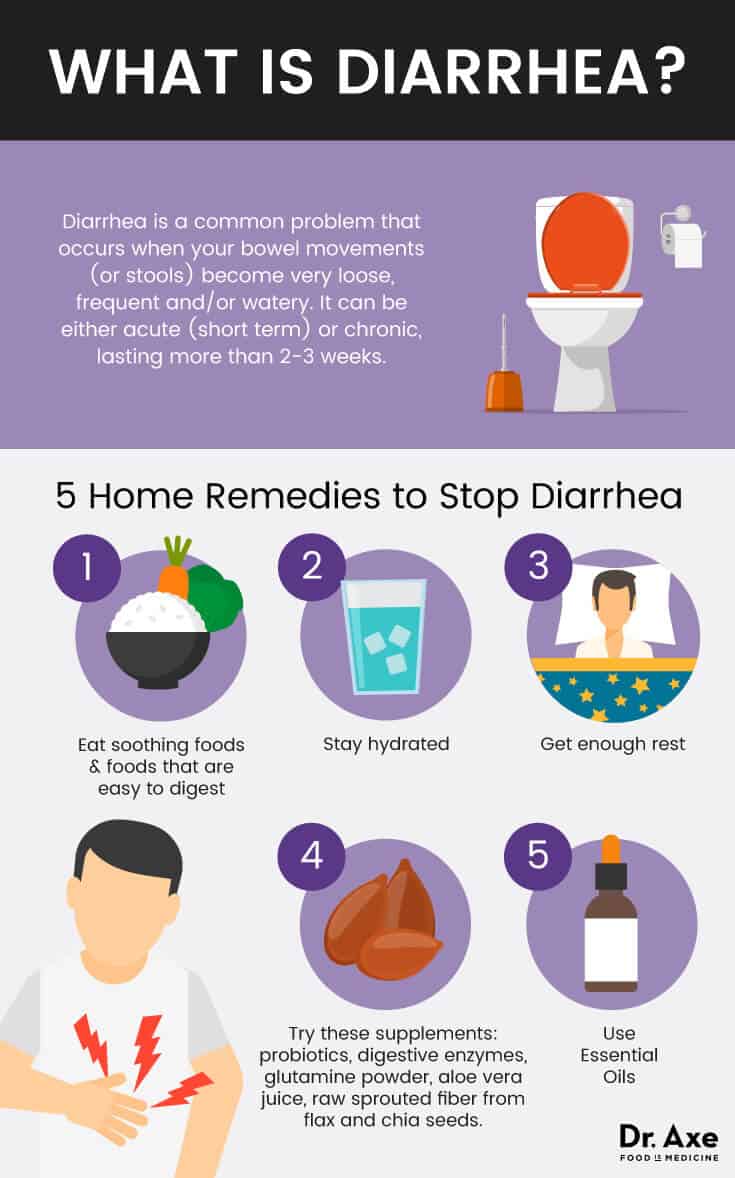How to Stop Diarrhea: Conventional Treatments
Unless you’ve had diarrhea symptoms for more than one to two weeks, especially if you aren’t sure why they’re happening and they don’t seem to be getting any better from treatments described above, it’s usually not necessary to see a doctor. If you do decide to get a professional opinion, your doctor will likely recommend some of the following treatments for diarrhea:
- Anti-diarrheal medications: These medications, also known as anti-motility medicines, can help shut down diarrhea symptoms quickly, but this isn’t necessarily always a good thing. Because diarrhea is one of your body’s natural mechanisms for shedding toxins or microbes that have made their way into your GI tract, not allowing this “purge” to happen might mean that harmful bacteria stay inside your body longer. For this reason many doctors are now recommending that you “wait out” acute cases of diarrhea without taking anti-motility medications if you can, as long as you’re not at risk for complications and try to combat dehydration naturally.
- Following an elimination diet: If you’re suffering from chronic diarrhea symptoms, then your doctor will likely recommend you try pinpointing which foods are problematic for you to digest by following an elimination diet. This means you avoid certain foods, such as dairy products, for a given period of time to determine if symptoms get better. Once you add the suspected food back into your diet you can track whether symptoms return and then make a judgement call about whether you should avoid the food for good.
- Staying hydrated and eating light, bland foods until you feel better (more on these treatments below).

How to Stop Diarrhea Naturally: 5 Home Remedies
1. Eat Soothing Foods and Those That Are Easy To Digest
What do you eat when you have diarrhea? Here are some of the top foods that can help you stop diarrhea symptoms:
- Eat lightly — the more food you consume, the harder your digestive organs have to work. You likely won’t have too much of an appetite while you have diarrhea, so try to eat small amounts spread throughout the day.
- Simple foods that are easy to digest — stick with a diet of bland foods like simple whole grains, apples, bananas and rice the first few days. These foods are easy on the digestive system and can provide some fiber to help add bulk to stools.
- Flaxseed oil — this has been shown to reduce the duration of diarrhea.
- Fruits and vegetables — these provide water, fiber and electrolytes. Try making a smoothie or sorbet with fruit, and steaming veggies to make them easier to digest. Monitor your symptoms to make sure they don’t get worse, however, as some people react badly to too much natural sugar.
- Raw honey and ginger — some people find that a small amount of honey and ginger root added to herbal tea (see below) helps soothe their stomach and reduce irritation.
What foods cause diarrhea? The following are foods to avoid when you have acute diarrhea, or suffer from chronic symptoms that keep returning:
- Conventional Dairy — Processed dairy can be hard to digest and can make diarrhea worse. However, raw cultured dairy, such as yogurt or kefir, is high in probiotics which can support bowel function.
- Any potential allergens — As mentioned above, diarrhea can result from food allergies like gluten, nuts, shellfish and dairy. (8)
- Processed fats and oils — Too much fat can upset your sensitive stomach and make the diarrhea worse. This can include fats from packaged products with refined vegetable oils, fast foods, cheesy foods, processed meats or fried foods.
- Added sugar and artificial sweeteners — Bacteria love to eat sugar, and sugar reduces immune system and digestive functioning in many cases.
- Caffeine — Caffeine can stimulate muscles in the digestive tract, increasing bowel movements and cramping.
- Carbonated, sugar drinks
- Alcohol
- Potentially foods with FODMAP carbohydrates, if they make your symptoms worse. Reactions vary from person to person, but problematic foods might include: pears, oats, beans/legumes, wheat, corn, soy, potatoes and any type of bran.
2. Stay Hydrated
Want to know how to stop diarrhea symptoms like dizziness or weakness that are tied to dehydration? Drinking enough water is critical when you’re losing so much in your stool. To keep dehydration symptoms from getting worse when you have diarrhea, try to drink 16 ounces of fluids about every hour. You can also get fluids through drinking homemade bone broth, which will additionally provide many nutrients you’re in need of (like amino acids and electrolytes). Herbal teas including ginger, peppermint, oat bark, licorice/fennel or pomegranate tea (non-caffeinated) may also help soothe your stomach.
Although it’s not a good solution for everyone, drinking coconut water (a natural source of electrolytes), fresh vegetable juice or sucking on homemade fruit ice pops can also be a good way to get more water and nutrients into your system. However, don’t consume too much juice, or too much liquid too quickly, if you notice this worsens the diarrhea. You can judge if you’re losing too much water by paying attention to the color of your urine, as well as how thirsty you are. If you’re not having to urinate often, but when you do your urine is very dark yellow, drink more water. Drink so that your thirst seems about normal and your urine is light yellow.
3. Get Enough Rest
Avoid too much exercise or strenuous physical activity when you’re dealing with diarrhea. Chances are you will feel weak and a bit run down and you might not be sleeping well while your symptoms persist. Give your body a chance to recover by getting enough sleep (8 hours per night or more), taking it easy, and trying to keep your stress levels down.
4. Try These Supplements
Certain supplements can help improve overall gut and digestive health, allow you to process the foods and nutrients you’re consuming more easily, and soothe an upset stomach. I recommend trying some of the following:
- Probiotics (50 billion units daily): Probiotics help fight infection and can help re-colonize the gut with healthy bacteria. These are available in supplement form and also in cultured/fermented foods.
- Digestive Enzymes (2 before each meal): These enzymes will help with nutrient absorption.
- Glutamine powder (5 grams 2x daily): Glutamine is an amino acid that helps repair the digestive tract, especially important for people with chronic diarrhea. It’s available in supplement form and also naturally in bone broth.
- Aloe Vera Juice (1/2 cup taken about 3x daily): Aloe is healing to the lining of the digestive system and easy to break down.
- Raw Sprouted Fiber from Flax and Chia seeds (2-3 tablespoons daily): Soluble fiber found in seeds can help thicken stools and reduce the frequency of diarrhea.
5. Use Essential Oils
Studies have found that peppermint essential oil can reduce bowel inflammation and soothe the digestive tract, reducing loose stools. Studies have also found that peppermint oil has active ingredients including menthol or monoterpine, which has anti-spasmotic properties due to its ability to block calcium channels within the intestinal smooth muscles. This helps stop cramping, frequent elimination and pains.
One review found that 8 out of 12 placebo-controlled studies showed statistically significant positive effects in favor of peppermint oil compared to control groups/placebo. (9) Certain studies have found that use of peppermint oil seems to be most effective in relieving abdominal pain in diarrhea in people with diarrhea-predominant irritable bowel syndrome, which is often caused by multiple factors and can be hard to treat. One double blind randomized placebo-controlled study involving 74 patients with IBS found that after six weeks of using peppermint oil three times daily, abdominal pain and quality of life was markedly improved compared with a placebo group not using peppermint. (10)
How to Stop Diarrhea in Infants and Children
Infants are especially susceptible to dehydration that can happen along with diarrhea. Plus, they’re more likely to have diarrhea due to allergies or illnesses since their immune systems aren’t yet fully developed or strong. It’s estimated that 3 percent of infants are allergic to proteins found in dairy. This includes the dairy found in most formulas, as well as dairy obtained from breast milk if the mother is consuming dairy. Symptoms to look out for that indicate a milk protein allergy include vomiting and developing a rash, in addition to diarrhea. It’s not safe to give infants or young children anti-diarrheal medications that are meant for adults. Rather, it’s recommended you try these treatment methods instead:
- Give the infant/baby more liquids that normal. Offer lots of liquids. Try to offer breast milk or a bottle with water more often; however, remember that sugary drinks like juice can make diarrhea symptoms worse, so avoid these.
- Most pediatricians now recommend trying to give infants/babies a source of electrolytes when they’re experiencing diarrhea, especially lost sodium.
- Give them probiotic foods. Cultured or fermented foods like kefir, yogurt, cultured veggies or supplements and even oral drops all contain probiotics. They help restore healthy bacteria in the digestive tract and can be useful for reducing many forms of digestive upset.
- If your baby develops skin irritation and diaper rash due to you having to change their diaper often, be very gentle. Use a washcloth and warm water to clean them, instead of wipes and lots of drying soap. Let their skin air dry. Then apply an ointment or moisture barrier for protection, like petroleum jelly or zinc oxide.
- Diarrhea should go away within one to three days if the child starts to get better. If it does not go away, call their doctor. You’ll want to rule out other health problems and make sure they aren’t suffering from an intestinal or yeast infection.
Precautions
It’s usually best to try treating acute diarrhea on your own for several days, tracking if your symptoms improve with help from the recommendations above while you wait it out. However, visit your doctor if diarrhea occurs in infants or young children for more than several days in a row, the elderly, anyone who is underweight and already suffering from health problems, or someone who develops more serious symptoms including: (11)
- Blood or mucus in your stool
- Weight loss
- Fever
Pay attention to signs that you’re becoming dehydrated and take steps to drink more water and obtain electrolytes. If you become dizzy, very weak or confused, then consult with your doctor to avoid complications.
Final Thoughts
- Diarrhea is a common problem that occurs when your bowel movements (or stools) become very loose, frequent and/or watery. It can be either acute (short term) or chronic, lasting more than two to three weeks.
- Diarrhea is caused by factors including food allergies, an infection or virus, dehydration, stress and certain medications.
- Natural ways to help get rid of diarrhea include drinking enough fluids, consuming bland foods and getting enough rest.



![How to fix error 0xc000000e windows 10 2022 100 SOLVED 5 How to fix error 0xc000000e windows 10 2022: [100% SOLVED]](https://dreamcheeky.com/wp-content/uploads/2022/06/How-to-fix-error-0xc000000e-windows-10-2022-100-SOLVED.jpg)
![how to fix Error code 0xc0000001 2022 100 FIXED 6 how to fix Error code 0xc0000001 2022 :[100% FIXED]](https://dreamcheeky.com/wp-content/uploads/2022/06/how-to-fix-Error-code-0xc0000001-2022-100-FIXED.jpg)